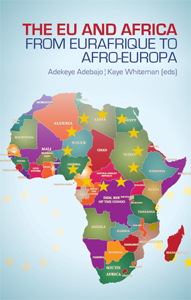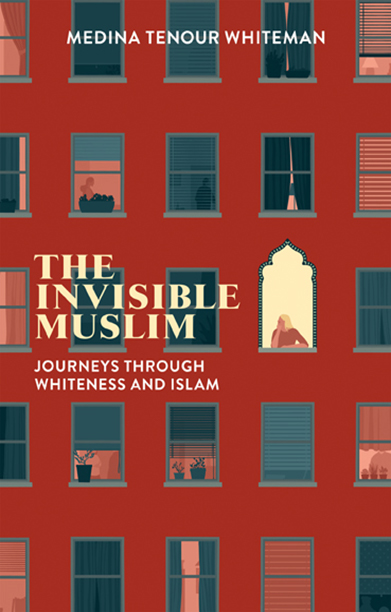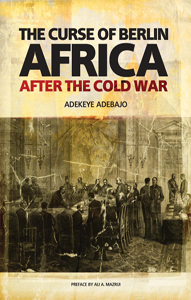The EU and Africa
From Eurafrique to Afro-Europa
‘An impressive, meaty and carefully cross-referenced volume. It will be essential reading for development practitioners, scholars and students of international relations and development studies.’ — Gordon Cumming, Journal of Modern African Studies
Description
This book offers a holistic and comprehensive assessment of the European Union’s relations with Africa, focusing on their historical, political, socio-economic, and cultural dimensions. In the high imperial period from the nineteenth century, some in Europe advocated the idea of ‘Eurafrique’ — a formula for putting Africa’s resources at the disposal of Europe’s industries. After tracing Europe’s historical attempts to remodel relations following African independence from the 1960s and Europe’s own quest for unity, this book examines the current strategic dimensions of the relationship, especially the place of Africa in Europe’s own need for global partnerships. Key issues are then analysed, from trade and investment to the growing priorities of security and governance, offering case histories of the role of key European players in Africa — France, Britain, Portugal, and the Nordics — within the context of the EU. The volume concludes by examining the important issues of migration and identity, especially in view of Europe’s controversial immigration policies and complex relations with the Maghreb and Mediterranean, as well as perceptions of past and current European identity.
This book argues that Africa and Europe still appear not to have fully escaped the burdens of history, and examines the feasibility of elaborating and practising, in future, an ‘Afro-Europa’: a new relationship of genuine equality, partnership, and mutual self-interest between both continents that sheds the baggage of the ‘Eurafrique’ past.
Table of contents
1. Introduction
Kaye Whiteman
PART 1: AFRICA AND EUROPE IN HISTORICAL PERSPECTIVE
2. The Rise and fall of Eurafrique: From the Berlin Conference of 1884-1885 to the Tripoli EU-Africa summit of 2010
Kaye Whiteman
3. Paradis Lost and Found: The African Union and the European Union
Adekeye Adebajo
PART 2: POLITICAL, ECONOMIC AND STRATEGIC DIMENSIONS
4. The Travails of Regional Integration in Africa
Adebayo Adedeji
5. Europe, Africa and Aid: Towards a Genuine Partnership
Rob de Vos
6. South Africa and the EU: Where Lies the Strategic Partnership?
Talitha Bertelsmann-Scott
7. The EU, the Maghreb and the Mediterranean
George Joffé
8. The EU and Asia: Lessons for Africa?
Shada Islam
PART 3: TRADE, INVESTMENT, AND DEVELOPMENT
9. Global Africa: The Last Investment Frontier?
Liam Halligan
10. An Anatomy of the Economic Partnership Agreements
Mareike Meyn
11. Africa and Europe” ending a Dialogue of the Deaf?
Gilbert M. Khadiagala
12. A Critique of the EU’s Common Agricultural policy
Charles Mutasa
PART 4: SECURITY AND GOVERNANCE
13. AU-EU Security and Governance Cooperation
Garth Le Perre
14. The EU Security Role in the Great Lakes region
Aldo Ajello
15 The Eu Security Role in Chad and the Central African Republic
Winrich Kühne
PART 5: THE EU-AFRICA POLICIES OF FRANCE, BRITAIN, PORTUGAL, AND THE NORDICS
16. France, the EU, and Africa
Douglas A. Yates
17. Britain, the EU, and Africa
Paul D. Williams
18. Portugal, the EU, and Africa
Alex Vines
19. The Nordics, the EU, and Africa
Anne Hammerstad
PART 6: MIGRATION AND IDENTITY
20. Migration and ‘Fortress Europe’
Andrew Geddes
21. The Black Atlantic from Othello to Obama: in Search of a Post-Racial Society
Ali A. Mazrui
22. Europe’s Post-Colonial Role and Identity
Hartmut Mayer
Reviews
‘This edited collection of studies covering the relationship between Europe and Africa over the past 50 years is good, timely and rare. For all those involved in African affairs, development issues, the global economy, conflict resolution or the evolution of the European Union’s relations with the rest of the world, it offers a number of valuable insights through some excellent contributions from those closely involved. It poses big questions about the EU-Africa relationship, puts them in historical context and digs deeper into a number of aspects through case-studies on the economics, the politics, the specific approach of key member states and some regional conflicts where the European Union has become involved.’ — International Affairs
‘This book provides a firm, non-compromising, educative, and non-biased assessment of the EU’s relationship with African countries. … With this expertly assembled array of authors, the volume is well written with balanced arguments and a precise narrative. … Beneficial to everyone in Europe, Africa and beyond who wants a keen understanding of the history of the continents and their postcolonial and post-Cold War relationship. … This groundbreaking study acts as a harbinger for future study of the relationship between the EU and Africa in the post-Cold War context without undermining the colonial legacy.’ — Norman Sempijja, H-Net Reviews
‘This is a most welcome and vibrant guide to the EU’s most enduring and guilt-inducing set of external relationships. It is required reading for all those interested in what Europe means to Africa, and vice versa.’ — Professor Christopher Hill, University of Cambridge
‘A timely, analytical and exhaustive interpretation of the complex and dynamic cooperation between Africa and the EU — a must read for all who wish to expand their insights into the contemporary challenges in Africa-EU relations’. — Dr Mohamed Chambas, Secretary-General, African, Caribbean, and Pacific Group
‘This is a much needed, impressive and thought-provoking work on the development and diversity of the EU-Africa relations… it raises the complex, but critical, key question: How can an EU-Africa partnership claim the future in a radically changing global environment? … an essential collection.’ —Ambassador Torben Brylle, former EU Special Representative for Sudan
‘This publication is very welcome….. and covers key issues at the heart of the relationship between Africa and the EU. It is therefore a very useful tool for people working within the area of EU-Africa relations. The book also provides an up-to-date analysis of all the facets of this relationship. … a must read for all seeking knowledge in this field.’ — Professor Peter H. Katjavivi, Former Namibian Ambassador to the EU
‘A valuable collection of essays … The EU and Africa deserves a wide readership, not least because it is at the forefront of questioning this relationship. It is well-written, with an impressive roster of contributors.’ — Bram Posthumus, Think Africa Press
‘a firm, non-compromising, educative, and non-biased assessment of the EU’s relationship with African countries … For an area of study that has had little written about it, the book takes a great leap in showing the opportunities and challenges of developing an equal relationship between the EU and Africa. This groundbreaking study acts as a harbinger for future study of the relationship between the EU and Africa in the post-Cold war context without undermining the colonial legacy.’ — Norman Sempijja, H-Diplo
‘This groundbreaking study acts as a harbinger for future study of the relationship between the EU and Africa. Well written with balanced arguments and a precise narrative … this book provides a firm, noncompromising, educative, and non-biased assessment of the EU’s relationship with African countries. Apart from students, practitioners, academics, and policymakers interested in Africa and the EU, the volume can be beneficial to everyone in Europe, Africa, and beyond who wants a keen understanding of the history of the continents and their postcolonial and post-Cold War relationship.’ – Norman Sempijja Rouen Business School, H-Net Reviews in the Humanities & Social Sciences
‘ a fair and nuanced exploration of an often controversial subject…This book is recommended not only to Africanists who wish to learn more about the place Africa occupies in EU foreign relations, but also to Europeanists who would benefit from a more critical look at the Africa-EU partnership…’ — Antoine Rayroux, Politique africaine
Editor(s)
A former Rhodes scholar at Oxford University, Adekeye Adebajo is Executive Director of the Centre for Conflict Resolution (CCR) in Cape Town, South Africa. He is the author of, inter alia, The Curse of Berlin: Africa After the Cold War (Hurst, 2010); and UN Peacekeeping in Africa (2011).
Kaye Whiteman was a journalist/writer on African affairs. He was a London-based editorial adviser to Business Day (Nigeria) and wrote for The Guardian, The Annual Register, Afrique Asie and Geopolitique Africaine. He was formerly Editor-in-Chief and Managing Editor of the London-based weekly magazine West Africa.


